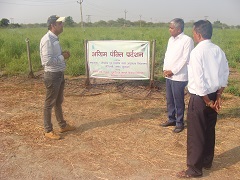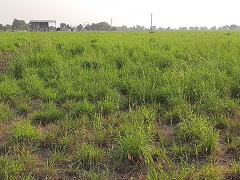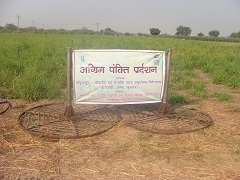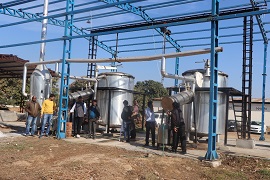Due to richness in Geraniol content, the Palmarosa (Cymbopogon martinii) and Jamarosa (C. nardus) are high in demand. Its essential oil is now in great demand for perfumery, medicinal and household uses. Its popular rose-like odours can be found in many cosmetics and perfumery industries not just for the pleasant smell, but also as a source of high grade Geraniol. The cultivation of aromatic grasses is gaining popularity due to the high value essential oil and to meet out the domestic needs and export in the International markets.


The heavy use of chemical fertilizers / other inputs to get high crop yield, poor soil fertility, damage caused by monkeys and other wild animals are among the major challenges being faced by the farmers in the North Gujarat besides, the incidence of pests and diseases.


The need for identifying the alternate suitable Medicinal & Aromatic Plants for the farmers of North Gujarat who are involved in traditional cultivation of rice, wheat, potato, cotton, vegetables was felt as they lacked profits like other progressive farmers.
Many aromatic plants are known to perform well in poor or problematic land. The aromatic grasses like Palmarosa, Jamarosa and Lemongrass could be successfully grown on moderately alkali soils having pH upto 9.0. Such crops are fairly tolerant to moisture stress. These grasses not only produce essential oils, but also amend the soil condition. The cultivation of aromatics, especially, Palmarosa is less risky in terms of wild animal, pest and diseases attack and potentially grown even in the marginal lands. Thus, the integration of Jamarosa and Palmarosa crops into the existing farming system was thought to be one of the viable options for the farmers as it fetches good returns per Rupee investment.
The fields with clay loam soil type were selected and supplied with 5 t/ha Farm Yard Manure (FYM) and waste decomposer with irrigation water. The cultivation of Palmarosa / Jamarosa were demonstrated in the farmers’ fields in larger plots (> 15 ha) through four front-line demonstrations.
The Vahelal Village of Gujarat has emerged as an aromatic grass cultivator. The North Gujarat (Mahesana) is a region known for rice, wheat, potatoes and cotton cultivation. The farmers having wild animals, degraded soil, high input cost, and unavailability of labourer’s problems were convinced about the suitability and profitability of Palmarosa / Jamarosa cultivation.
With the support of ICAR-DMAPR, Boriavi, Gujarat, a farmer - Shri Ghanshyambhai Patel started the plantation of aromatic crops Palmarosa during 2016-17 and Jamarosa during 2017-18. The FLDs and one day training at Vahelal was financially supported by the CSS, DASD, Calicut, Kerala. The crops were raised for essential oil extraction and the farmer had a steam distillation unit facility at his field. Now, he has started the establishment of a new fractionation plant for separation of Geraniol or Geranyl Acetate from essential oil.
After four years of cultivation, the farmer achieved good amount of profit, improved physical condition of the soil, more than 50% saving of labourers / inputs / irrigation water, easy during storage, no any animal problems and residue after oil extraction can be used for animal feed and fuel for essential oil extraction purposes.
The Palmarosa and Jamarosa crops can be raised for the different purposes like to harvest fresh leaves for essential oil extraction, seed production, QPM supply and animal fodder after oil extraction, etc. On an average, a farmer can also get net returns (Rs. 1.5 Lakhs/ha/Year) from Palmarosa cultivation and (Rs. 1.59 Lakhs/ha/Year) from Jamarosa cultivation.
(Source: ICAR-Directorate of Medicinal and Aromatic Plants Research, Anand, Gujarat)








Like on Facebook
Subscribe on Youtube
Follow on X X
Like on instagram